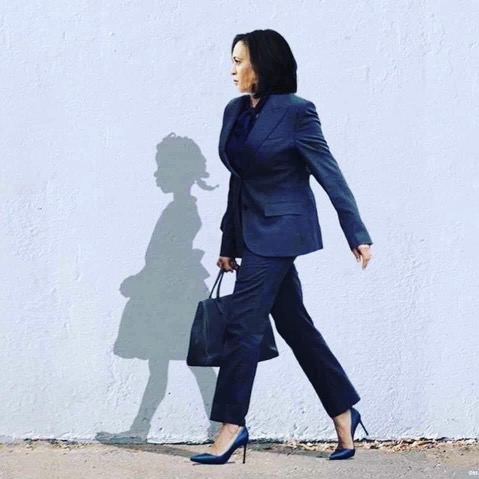
For 10 days before Saturday, November 7, when all the TV networks called Biden the winner (and more important, Trump the loser) I couldn’t look at the news because I was so worried than Trump might win. I was a media coward. I realized that this behavior was a pattern. Whenever I am faced with a difficult and distasteful situation, I often retreat and shut down rather than confront it.
On the other hand, my wife, Julia, for the last month confronted the situation and did something about it. She, like millions of women had the courage, discipline and grit to turn out the vote for the Biden-Harris ticket. Julia was on the phone every evening for over two hours calling people to urge them to vote.
Biden and Harris owe their victory to urban and suburban women like Julia and, especially, to Black women.
Even though I couldn’t muster the courage or energy to work for the outcome I wanted, the first candidate in the Democratic primary way back in what seems to be decade ago in January, 2019, that I supported financially was Kamala Harris. I supported Hillary Clinton in 2016, and I supported Kamala Harris and Elizabeth Warren in 2019 and 2020 because I felt that men had screwed up long enough, and that we needed a compassionate, nurturing, caring woman for president.
The title of my Ph.D. dissertation (unfinished) in 1983 was “The Nature of Broadcast General Managers’ Work: A Comparative Study of Results-Based Effective and Less Effective and Male and Female Managers.” An overly opaque, academic way of saying “why women are better managers.” I had recognized that women were better, more effective managers when I was able to observe them as sales managers and news directors in radio and television stations I consulted and did training for in the late 1980s and 1990s and at the Management Seminar for News Executives at the University of Missouri School of Journalism.
These women were better salespeople, better sales managers, better news directors and better general managers because they were more collaborative, more cooperative and more nurturing (better coaches). If this was true in broadcast sales, news and general management, why wouldn’t it be true in other businesses and in politics?
My admiration for Black women probably began when I was a teenager in Washington, D.C. when I realized that the cook, Maggie, my mother and father hired for special and holiday meals was a superior chef and person. One summer we took Maggie to our summer rental home in Rehoboth, DE for the two weeks my father had off. After dinner, I would do the dishes while my father and Maggie would drink scotch and talk about life and politics like two old buddies.
This admiration for Black women was reinforced when I was on the Graduate Admission Committee at the University School of Journalism. One year, it might have been 1992, we admitted Lynise Weeks to the graduate program. We reversed our original vote not to admit her because the graduate dean, Esther Thorson, advocated for Lynise and urged us to admit her.
As I remember, the reason Esther Thorson advocated for Lynise was because after the Graduate Admissions Committee turned her down, Lynise sat outside the graduate dean’s office for almost a day insisting that she wouldn’t leave until the dean saw her. Exasperated, Thorson, finally saw Lynise, who told the dean that, “You have to let me in because I’m going to change the world.” Thorson believed her and urged the committee to reverse our decision and admit Lynise into the Broadcast News sequence. So, we did.
Lynise was a large woman with a dark black complexion. She filled the television screen and was hard to light, but she broke down these barriers just as she broke down the barriers to admission into the J School. She became the most popular (internally and externally) reporter on university-owned KOMU-TV because of her warm, sonorous voice, her commanding presence and her highly intelligent reporting.
At the J School graduation award ceremony I gave Lynise a hammer and said, “This is the new Hammer Award and goes to Lynise because she broke down barriers and won’t take ‘no’ for an answer.” Almost immediately after graduation she got a job as a reporter at WTMJ-TV in Milwaukee, and after several years there was given her own half-hour weekly consumer-advocacy program, virtually unheard of in local television. Lynise passed away in early 2008 after battling kidney failure.
I think one of the reasons I admired Lynise was because she reminded me of another Black woman, in addition to Maggie, who I admired — Barbara Jordan. Jordan was the first Black congresswoman from Texas, and was a member of the House Judiciary Committee. As a member of that committee, she gave a magnificent opening speech in July, 1974, at the impeachment hearing of Richard Nixon. I remember watching her speech on television and how it influenced me to turn against Nixon, for whom I had voted.
When my daughter, Crickett, sent me the picture at the top of this blog post, I wept. I wept buckets. I wept because the picture of Harris and the shadow of the courageous little Black girl going to a desegregated school in Norman Rockwell’s iconic painting perfectly portrayed the historic, gritty journey of Black women that culminated in Harris’s election. I wept as a cathartic release of my anxiety. I wept because of my shame of non-involvement. I wept because I realized that Maggie, Lynise and Barbara, all of whom I admired, were not here to weep for joy.
My reclamation was weeping for them.
